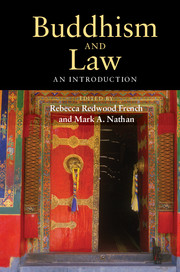Book contents
- Frontmatter
- Dedication
- Contents
- Maps and Illustrations
- Contributors
- Preface
- Abbreviations
- Introducing Buddhism and Law
- Part I The Roots of Buddhism and Law in India
- 1 Society at the Time of the Buddha
- 2 What the Vinayas Can Tell Us about Law
- 3 Keeping the Buddha’s Rules
- 4 Proper Possessions
- 5 On the Legal and Economic Activities of Buddhist Nuns
- Part II Buddhism and Law in South and Southeast Asia
- Part III Buddhism and Law in East Asia
- Part IV Buddhism and Law in North Asia and the Himalayan Region
- A Selection of Readings
- Index
- References
1 - Society at the Time of the Buddha
Published online by Cambridge University Press: 05 August 2014
- Frontmatter
- Dedication
- Contents
- Maps and Illustrations
- Contributors
- Preface
- Abbreviations
- Introducing Buddhism and Law
- Part I The Roots of Buddhism and Law in India
- 1 Society at the Time of the Buddha
- 2 What the Vinayas Can Tell Us about Law
- 3 Keeping the Buddha’s Rules
- 4 Proper Possessions
- 5 On the Legal and Economic Activities of Buddhist Nuns
- Part II Buddhism and Law in South and Southeast Asia
- Part III Buddhism and Law in East Asia
- Part IV Buddhism and Law in North Asia and the Himalayan Region
- A Selection of Readings
- Index
- References
Summary
Introduction
How do we understand the contexts within which notions of law were developed in early Buddhism? We first need to localize early Buddhism within the geography of the Indian subcontinent. We can then turn to traditions of codification that were in dialogue with one another, remembering that Buddhism was not an isolated phenomenon. Next we will contextualize these traditions in terms of the key economic, political, and social developments that characterized the region at the time.
Historians attempting to reconstruct the milieu of early Buddhism have drawn on a variety of sources. These include texts considered to be part of the early Buddhist Pāli canon, later Vedic and post-Vedic Brahmanical works in Sanskrit, as well as a range of archeological evidence. The latter includes finds from explorations and excavations at sites associated with early Buddhism and elsewhere, along with some of the earliest inscribed material. Not all the sources tell the same story, nor have scholars approached them with the same sets of questions. Consequently, our understanding is fragmentary in more ways than one. This is a limitation that we need to acknowledge at the very outset.
- Type
- Chapter
- Information
- Buddhism and LawAn Introduction, pp. 31 - 45Publisher: Cambridge University PressPrint publication year: 2014



